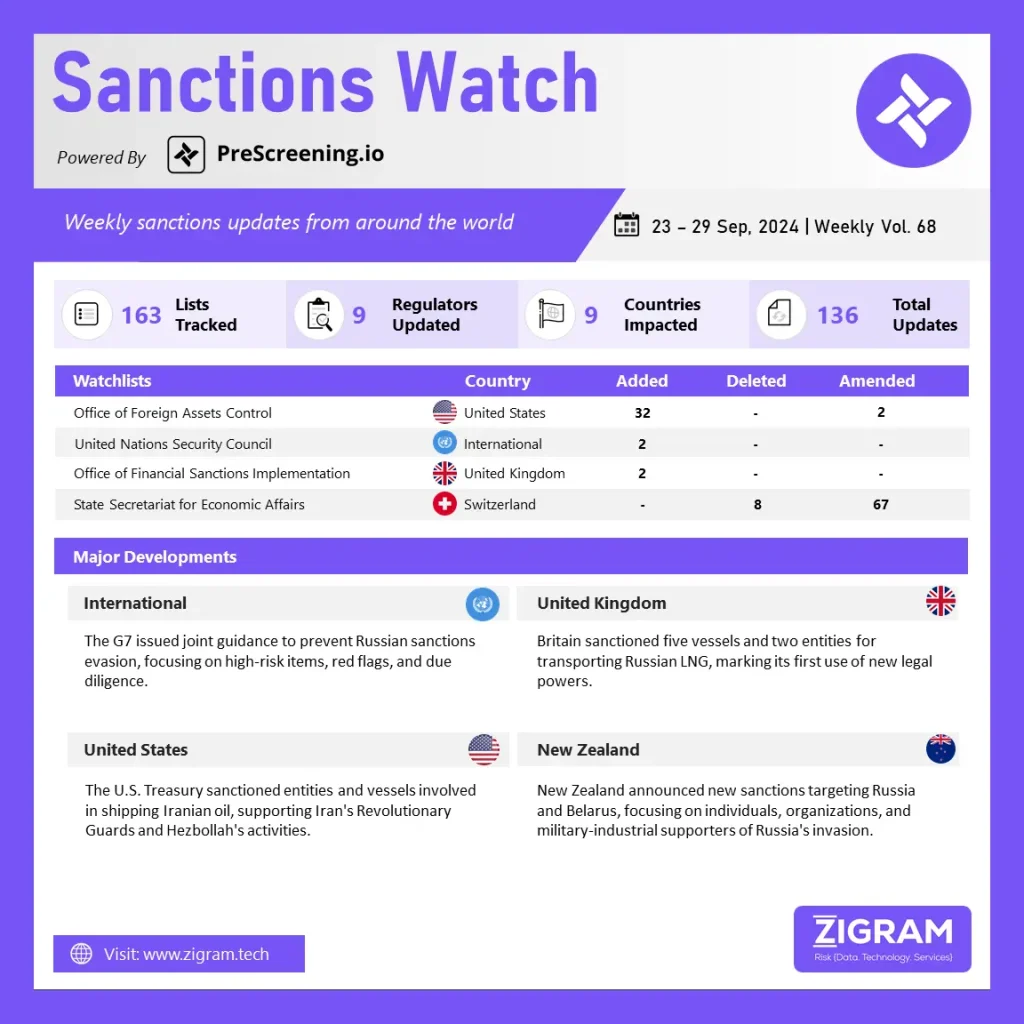Sanctions Watch Vol 68
In the latest edition of our Sanctions Watch weekly digest, we present significant updates on sanction watchlists and regulatory developments.
1.The G7 Issues Guidelines For Industries On Preventing Evasion Of Export Controls And Sanctions Placed On Russia
The G7, comprising the United States, Canada, France, Germany, Italy, Japan, the UK, and the EU, has issued its first-ever joint guidance for industry to prevent the evasion of sanctions and export controls imposed on Russia. This guidance, announced in Brussels, highlights three priority areas: items at high risk of diversion to Russia, red flag indicators of sanctions evasion, and best practices for enhanced due diligence. The document aims to help industries across the G7 detect and respond to Russia’s evolving evasion tactics. Assistant Secretary for Export Enforcement, Matthew S. Axelrod, emphasized the importance of industry partnerships in preventing Russia from acquiring components for missiles and UAVs.
This guidance is part of the G7’s broader efforts since February 2022, in collaboration with the Global Export Control Coalition (GECC), to restrict Russia’s access to critical technologies amid its war in Ukraine. The initiative seeks to protect priority items, prevent reputational harm, and ensure compliance with sanctions.
2. Britain Imposes New Shipping Sanctions On Russia’s LNG Sector
Britain sanctioned five vessels and two associated entities involved in transporting Russian LNG. This marks the first time the UK is using new legal powers to directly target LNG vessels. The government stated, “Earlier this year, the UK, alongside the US and EU, sanctioned Arctic LNG 2, forcing the project to significantly reduce production. The measures expand on this by targeting ships and entities crucial to Russia’s LNG sector and future energy production.” Earlier this month, Britain also sanctioned 10 vessels in Russia’s “shadow fleet,” which reportedly employ illicit methods to evade Western sanctions on Russian oil.
Despite Western efforts to curb oil exports, Russia continues to resist these measures, and the number of tankers transporting unregulated and uninsured cargoes has increased in the past year. These actions are part of the ongoing efforts to limit Russia’s energy export capabilities amidst the ongoing conflict.
3. US Issues Sanctions Over Shipment Of Iran Oil To Syria, East Asia
The U.S. Department of Treasury announced sanctions on Wednesday targeting over a dozen entities and vessels involved in the shipment of Iranian crude oil and liquid petroleum gas to Syria and East Asia, benefiting Iran’s Revolutionary Guards and Hezbollah. Among the vessels were four ships linked to Syrian shipping magnate Abdul Jalil Mallah, who was sanctioned by the U.S. in 2021, and his brother Luay Al-Mallah, who was newly designated under U.S. sanctions.
The Treasury highlighted that the brothers continued using their shipping network to support Iran’s malign activities and those of its proxies. Bradley T. Smith, Acting Under-Secretary of the Treasury for Terrorism and Financial Intelligence, emphasized that Iran heavily depends on the illicit sale of oil and gas through the Revolutionary Guards and Hezbollah to fund terrorist activities and destabilizing actions. These sanctions reflect ongoing efforts to curb Iran’s influence and the operations of its affiliated networks.
4. New Zealand Introduces New Sanctions Against Russia And Belarus
New Zealand has announced a new sanctions package targeting Russia and Belarus, as stated by Foreign Minister Winston Peters on the government’s official website. Peters emphasized that Russia’s illegal occupation of Ukraine’s Zaporizhia NPP endangers global nuclear safety, urging Russia to withdraw from the NPP and Ukraine’s territory. The sanctions focus on five individuals and six organizations involved in the occupation and those supporting Russia’s military-industrial complex. The measures also extend to Belarusian individuals and entities that back Russia’s invasion.
Meanwhile, Turkish Foreign Minister Hakan Fidan indicated that lifting sanctions on Russia could be a topic of future negotiations regarding Ukraine. He acknowledged that some groups are invested in prolonging the conflict but expressed concern about the evolving nature of the confrontation. These developments highlight the ongoing international efforts to address the war in Ukraine and its broader geopolitical implications, including the role of sanctions in conflict resolution.
Know more about the product: PreScreening.io
Click here to book a free demo.
Sanctions Watch is a weekly recap of events and news related to sanctions around the world.
- #G7
- #UnitedStates
- #Canada
- #France
- #Germany
- #Italy
- #Japan
- #UK
- #EU
- #Sanctions
- #Russia
- #GECC
- #Ukraine
- #SanctionsWatch
- #InternationalSanctions
- #EconomicSanctions
- #RegulatoryCompliance
- #TradeCompliance
- #SanctionsEnforcement
- #SanctionsViolations
- #FinancialCrime
- #IranianCrudeOil
- #LiquidPetroleumGas
- #Syria
- #EastAsia
- #Iran
- #Terrorist
- #TreasuryForTerrorismAndFinancialIntelligence
- #Britain
- #LNG
- #OilExports
- #NewZealand
- #Belarus
- #NPP
- #DueDeligence
